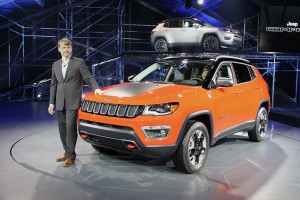
FCA CEO Sergio Marchionne is looking for an alliance, but hasn't ruled out selling the company outright.
Though Fiat Chrysler Automobiles appears to have rejected an acquisition bid from an unnamed Chinese automaker, many analysts and observers are now betting the Detroit carmaker will eventually partner up with, and possibly sell out to, a deep-pocketed Chinese manufacturer with global aspirations.
FCA CEO Sergio Marchionne has made no secret of his desire to find a partner, and possibly a buyer. But after being rejected by a range of major manufacturers, including General Motors, PSA and Volkswagen, the Chinese may present his best, and possibly his only remaining, opportunity, several sources told TheDetroitBureau.com.
“We could see a mad scramble among the top three of four players in China to tie up with an American partner and FCA is the one most open,” said Joe Phillippi, head of AutoTrends Consulting.
Trade publication Automotive News reported Monday that an unspecified automaker had made an offer to FCA. A source subsequently told TheDetroitBureau.com that it was a “lowball bid.” What isn’t clear is whether the potential purchaser was looking to buy FCA outright or simply cherry-pick some of its stronger assets.
(Is FCA ready to sell off Jeep and Ram? To see more, Click Here.)
While Marchionne has often suggested his goal is an alliance, he notably has not ruled out the alternative of the sale of his company and, during a recent conference call with industry analysts acknowledged he would even consider selling off specific FCA brands.

Mike Manley, shown introducing the new Jeep Compass last year, skipped a media event last month to take a trip to China.
The primary focus likely would be on the company’s two crown jewels, Jeep and Ram. Light truck sales are booming worldwide and, in the U.S. now account for almost two-thirds of the new vehicle market. Jeep sales have slid slightly this year, but only because of production issues related to a planned expansion of the brand. An all-new version of its iconic Wrangler model, for example, will soon start rolling off a completely refurbished plant in Toledo, Ohio. An assortment of new models, including a Jeep pickup and the reborn Wagoneer flagship model are in the pipeline, as well.
The question is what would be left if either Jeep or Ram – or both – were sold off. The two remaining U.S. brands, Chrysler and Dodge, have seen their product line-ups largely scaled back during the last several years, as U.S. passenger car sales have plunge. However, Marchionne has said he also sees great potential for Alfa Romeo and the even more upscale Maserati brands in China.
A sale of FCA could actually help the struggling Chrysler, Dodge and Fiat brands. The two American marque no longer even build passenger cars in the U.S. But while sales of sedans and coupes may have tumbled, there is still a market for them, stressed Phillippi, adding that such an alliance “could give FCA access to a Chinese (owner’s) small cars.”
In turn, an alliance or acquisition could prove a breakthrough for an ambitious Chinese car company, especially at a time when politicized trade tensions between the U.S. and China are rising.
China, on the whole, is facing the threat of trade sanctions by the Trump Administration because of a lopsided trade balance. But by acquiring FCA and retaining – and perhaps even expanding – its U.S. production base, some observers believe a Chinese automaker could enter the market without stirring up trade frictions.
(Click Here for details about FCA’s earnings results.)
The flipside is that there could be some significant backlash to a sale of the third-largest domestic carmaker to China considering the Chrysler side of FCA was saved only through a multi-billion dollar federal bailout following its 2010 bankruptcy. Eventually, the carmaker did pay back taxpayers as it completed a slow-speed merger with Italy’s Fiat. FCA is today registered as a Dutch company, with its official headquarters in London, though the sprawling facility in the Detroit suburb of Auburn Hills is the dominant corporate office, while there are still offices in Turin, Italy, as well.
A request for comment by FCA has not yet been returned. The automaker has told other outlets it would not comment on the reports.
With potential Western partners so far rejecting an alliance with FCA, the question now is who might be making an offer? Early this year, John Murphy, an influential analyst with Bank of America Merrill Lynch said he believed FCA could be purchased by a Chinese company within three to five years, with Guangzhou Automobile Group, or GAC, being one of the more likely bidders.
GAC already has a relationship with FCA. Under Chinese law, foreign manufacturers must partner with a local company to produce vehicles in the country, and the Jeep Renegade began rolling off an assembly line operated by GAC Fiat Chrysler Automobiles Ltd. in April 2016.
But FCA officials also met with representatives of Great Wall Motors at the American maker’s suburban Detroit headquarters in May. Meanwhile, Michael Manley, a senior FCA executive who, among other things, oversees the Jeep brand, skipped a major media event he was supposed to attend last month to fly to China. It is now clear whether that trip was related to a purchase offer, normal business involving Jeep production in China or, perhaps, both.
(For more about Marchionne’s efforts to find a partner, Click Here.)
“The timing couldn’t be better for a sale,” said analyst David Sullivan, of AutoPacific Inc. “While every other automakers is struggling with declining sales and bloated inventories of passenger cars, that’s not something that FCA has to deal with since they have a much less car-centric line-up.”
